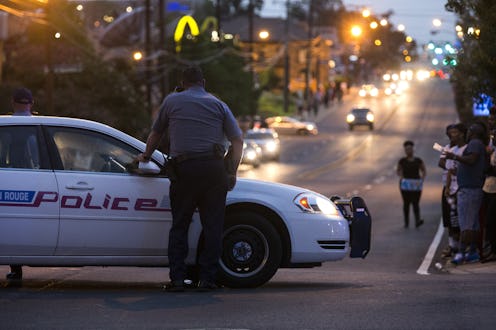News
Officers Will Not Be Federally Charged In Alton Sterling Case

UPDATE: While the Department of Justice stated Tuesday evening that it had not yet announced a decision in the case of Alton Sterling's death, an official confirmed Wednesday afternoon that earlier media reports were correct and that the officers involved in Sterling's death would not be charged. Corey Amundson, acting attorney for the Middle District of Louisiana, said investigators concluded there was not enough evidence to charged the officers.
EARLIER: According to the Washington Post, the group of Baton Rouge police officers involved in Alton Sterling's death will not be charged by the Justice Department. The department's announcement had not gone public as of Tuesday afternoon, but officials were reportedly preparing to announce the end of the department's investigation. Last July, 37-year-old Sterling was shot and killed by police outside of a convenience store where he was selling CDs.
Sterling's death inspired widespread protests throughout the city of Baton Rouge last summer. Baton Rouge police were reportedly preparing for similar demonstrations ahead of the Justice Department's announcement. The Advocate, a daily newspaper in Baton Rouge, reported Tuesday that local police chief Carl Dabadie Jr. and Sheriff Sid Gautreaux were both preparing their forces, even though they didn't know when an announcement would come.
Although no Baton Rouge officers will reportedly be charged by the Justice Department, there could still be the possibility of state charges. In January, the Advocate reported that the federal investigative team would turn over its files to the state upon closing its investigation. Then it's up to the Louisiana attorney general to decide if any state charges are warranted. Interestingly, Landry previously served as a police officer and sheriff's deputy in Louisiana.
Following the news reports of the Justice Department's supposed decision not to file charges, Black Lives Matter activist DeRay McKesson responded on Twitter. He called the lack of federal charges "no surprise." McKesson was arrested in Baton Rouge during the protests after Sterling's death. He later sued the city of Baton Rouge in a class-action lawsuit over the arrest.
Although no charges have been filed, Baton Rouge officials have taken steps to change the way the city does things after Sterling's shooting. For instance, the Baton Rouge Metro Council reportedly approved spending more than $2 million to purchase body cameras for police officers in the city. According to the Advocate, state lawmakers have proposed two police reform bills to increase training for officers and tighten hiring practices.
On the same day that the Justice Department prepared to announce the end of its Baton Rouge investigation, a development unfolded in a similar case elsewhere. In South Carolina, former North Charleston police officer Michael Slager pleaded guilty to a federal civil rights charge related to the shooting death of 50-year-old Walter Scott. Under a deal with the Justice Department, the remaining charges against Slager — including a state murder charge — will reportedly be dropped.
As Slager's case nears a close, the case in Baton Rouge may never get off the ground. Taken individually and together, the cases have raised concern over the Trump administration's approach to police brutality cases. The Justice Department is now run by U.S. Attorney General Jeff Sessions.